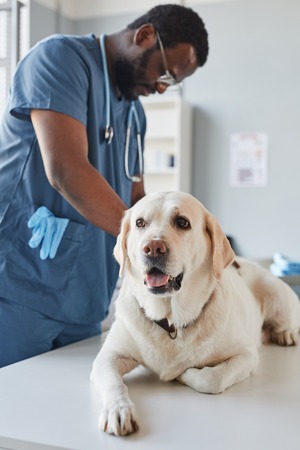Common Health Issues in Dogs and How to Prevent Them
December 03, 2024 | By David Jackson

Here at All About Dog Food, we firmly believe that dogs aren’t just pets - they’re family.
After all, they fill our lives with joy, love, and that special wag of the tail that brightens even the toughest days. And, as loving dog owners, we all want the same thing - for our four-legged companions to stay happy and healthy for as long as possible.
Now, while our pups give us their best every day, they rely on us to protect them from the health challenges they may face.
The good news? Many of these issues are preventable with the right care and a bit of know-how!
That’s why we’ve decided to explore some of the most common health concerns you may face with your dog in this article along with sharing some simple tips to keep them happy, and help you recognise when it’s time to seek expert advice from your vet.
Table of Contents
Table of Contents
Top Health Issues in Dogs
Dental Disease
 Did you know dental disease affects a staggering 80% of dogs by the age of three? (Royal Veterinary College, 2022).
Plaque and tartar can sneak up on your dog, leading to painful gums, tooth loss, and even serious infections if ignored.
Watch for early signs like bad breath, inflamed gums, or trouble chewing - it’s your dog’s way of saying, “I need help!”
Obesity
Canine obesity is a growing issue, with an estimated 40% of dogs in the UK overweight or obese (PDSA, 2023).
It’s more than just carrying a few extra pounds - obesity increases the risk of diabetes, arthritis, and heart disease.
Overeating, lack of exercise, and even breed tendencies can contribute, but a little extra care goes a long way toward keeping your dog trim and healthy.
Fleas and Ticks
Fleas and ticks aren’t just pesky, annoying little things - they can carry diseases like Lyme disease and trigger skin allergies.
Dogs that spend time outdoors are especially at risk, so it’s vital to stay one step ahead of these little invaders.
Ear Infections
Certain breeds, especially those with floppy ears or lots of fur in their ear canals, are more prone to ear infections.
Signs include scratching, head shaking, redness, or a bad smell from the ears.
Moisture, allergies, or underlying health problems can all play a part, but regular checks can help you catch problems early.
Hip Dysplasia
Large breeds like German Shepherds are more likely to develop hip dysplasia - a condition where the hip joint doesn’t develop properly, leading to arthritis and difficulty moving.
Genetics, rapid growth, and excess weight are common contributors, but careful management can help reduce the risk of your dog developing it.
Prevention Strategies – How to Keep Your Dog in Tip-Top Shape
OK, now that we know some of the most common health issues your dog may face, the big question is, how can we prevent them or reduce the risk of them developing in the first place?
 1. Regular Vet Check-Ups
The first line of defence? Routine vet visits. Annual or biannual check-ups help spot issues early, from dental problems to hidden health concerns.
A quick vet visit now can save your pup from a lot of discomfort down the road.
2. Balanced Diet and Exercise
What your dog eats - and how active they are - has a huge impact on their health.
Choose high-quality, breed-appropriate food, and keep portion sizes in check.
(And if you’re not too sure where to begin with their food, be sure to check out the All About Dog Food Directory.)
Pair that with daily walks, playtime, and mental challenges, and your dog will thank you with tippy tap feet!
Tip: Start with the feeding guidelines on the dog food package, then adjust based on your dog’s size, weight, and energy levels.
3. Grooming as a Health Practice
Grooming isn’t just about looking good, it’s essential for your dog’s health.
Regular brushing prevents matting and keeps their coat shiny and healthy, while bathing helps manage skin issues. Dogs with long hair will need to be groomed more often than short-haired dogs, but it’s still a good habit to get into.
Plus, handling your dog in this way allows you to feel for any unusual lumps or bumps hidden by their fur that may need to be checked out by your vet.
Don’t forget ear checks, nail trims, and paw care - they’re just as important!
4. Preventing Fleas and Ticks
Parasites like fleas and ticks can cause big problems, but prevention is easy through topical solutions, medications and even some homemade remedies.
There are plenty of options to suit you and your dog’s lifestyle.
5. Vaccinations and Preventatives
Vaccinations protect your dog from serious illnesses like parvovirus and distemper.
Pair these with preventatives for fleas, ticks, and heartworm, and your dog will have a solid shield against many common threats.
Did you know? Vaccinated dogs are 90% less likely to contract preventable diseases (British Veterinary Association, 2023).
When to Call Your Vet
Sometimes, even when you’ve taken all the necessary steps and precautions, your dog needs more than your care - they need professional help.
The British Veterinary Association recommends you contact your vet immediately if you notice:
- • Persistent vomiting or diarrhoea
- • Sudden weight changes
- • Changes in eating, drinking, or behaviour
- • Lumps, wounds, or skin issues that won’t heal
- • Breathing difficulties, limping, or unusual tiredness
Timely treatment can make all the difference!
In Conclusion
We know it seems quite daunting caring for your dog’s health, but it doesn’t have to be.
With regular vet visits, a balanced diet, proper grooming, and preventative care, you’ll give your dog the best possible chance at a long, happy life.
And remember, prevention is always better than cure. So, take steps today to keep your pup healthy, active, and ready for all of life’s adventures.
Frequently Asked Questions
1. How often should I take my dog to the vet for a check-up?
It is recommended to take your dog for a routine vet check-up at least once a year. Puppies, senior dogs, and those with chronic health issues may require more frequent visits. Every six months is a good rule of thumb for these groups. Regular check-ups help catch potential issues early, keeping your dog healthy and happy..
2. What is the best way to brush my dog’s teeth?
Using a dog-specific toothbrush and toothpaste is key. Never use human toothpaste, as it can be harmful. Start by letting your dog get used to the brush and paste, then gently lift their lips and brush in small circular motions. Aim to brush their teeth at least two to three times a week, but daily is ideal for preventing plaque build-up.
3. How do I know if my dog is overweight?
An overweight dog often has difficulty feeling their ribs through their skin and fat layer. They may also lack a visible waistline when viewed from above or a noticeable abdominal tuck when viewed from the side. If you are unsure, consult your vet, as they can assess your dog’s weight and provide guidance on diet and exercise adjustments.
Related Blog Posts Section
More From Our Blog
|